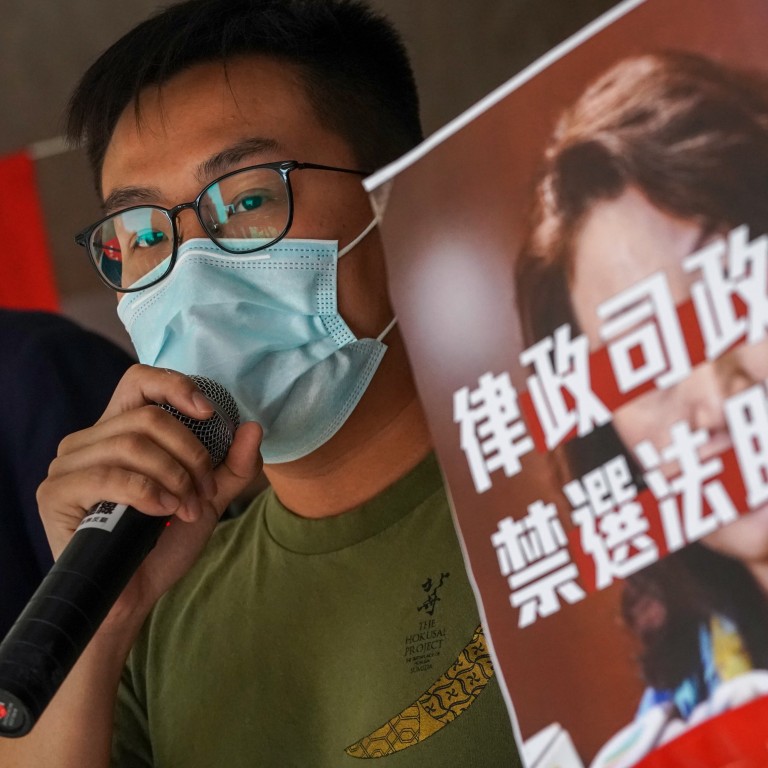
Let voters decide if a candidate is suitable for election, jailed Occupy activist Raphael Wong’s lawyer tells Hong Kong court
- Wong’s counsel says case raises questions about the right to stand for elections and ‘goes at the very heart of a democratic government’
- Government lawyer counters that provisions being challenged are to maintain public trust in institutions, as well as the character of members
Lawyers for a Hong Kong democracy activist barred from elections because of his jail term over the 2014 Occupy protests told a court on Tuesday that the assessment of a candidate’s suitability should be left to voters.
Raphael Wong Ho-ming, 31, lodged a judicial review challenging provisions in three ordinances governing the Legislative Council, district council and rural representative elections that disqualify a person from being nominated for five years in such polls, if he or she has been jailed for more than three months.
The League of Social Democrats chairman had considered standing for four elections between 2019 and 2024, but was restricted by the eight-month jail term imposed on him by the District Court on April 24 last year.
Wong has appealed against his latest conviction on two incitement charges and the jail term arising from his role in the Occupy movement on September 28, 2014.
There is no evidence that Wong standing for election would cause public confidence to diminish
His lawyer, Hectar Pun Hei SC, said the case raised “one of the most sensitive questions” as the impugned right to stand for election was “the most important civil and political right” which “goes at the very heart of a democratic and representative government”, and it “may be very tempting for a political power to strip opponents of this right”.
“The question is most sensitive because it could involve questions not related to the elections at all,” Pun said through videoconferencing live-streamed in the High Court.
The counsel argued that a blanket ban of five years was unreasonably long and had disproportionately infringed on Wong’s right, guaranteed by Article 26 of the Basic Law, the city’s mini-constitution.
He added that the ban was automatically triggered without reference to his client’s personal circumstances, the offence for which Wong was sentenced or the fact that he had lodged an appeal.
Pun also argued that the right to stand for election was directly linked to the interests of the electorate and guaranteed free expression of voters’ views, so the provisions in the ordinances had deprived people of their choice and the opportunity to assess candidates, as well as the offence committed by the individual.
“There is no evidence that Wong standing for election would cause public confidence to diminish,” he continued. “The question of suitability should be left to the voters.”
If the legislature is comprised of persons who are convicted criminals … one can say this is allowing persons who have scant respect for the rule of law to be representatives of the [council]
Pun invited the High Court to declare the relevant provisions disproportionate and unconstitutional, and leave it to the legislature to determine the appropriate restrictions on eligibility.
But Benjamin Yu SC, for the government, countered that the issue had already been actively debated and determined by the legislature, which in Hong Kong’s constitutional framework was best placed to handle the question as it would be particularly sensitive to the integrity of the electoral system.
Activist jailed over Occupy lodges legal bid against laws banning him from elections
“The rationale is this: We want a body consisting of people who would not have suffered an imprisonment of more than three months in the past five years,” Yu explained, also via videoconferencing.
“That is a political judgment by people who should know best who should be able to join their club, be it Legco, the district council or a rural committee.”
The legislature, he said, was entitled to draw a line at five years instead of one election, and three months was a sufficient indicator of the seriousness of an offence committed by an aspiring candidate.
Yu also explained that the provisions pursued a legitimate aim – shared by many countries – to maintain public trust and confidence in the relevant institutions as well as in the character, honesty and integrity of their members.
Defiant Occupy leaders released from prison immediately vow to join new protests
“If the legislature is comprised of persons who are convicted criminals … one can say this is allowing persons who have scant respect for the rule of law to be representatives of the [council],” he continued.
“The fact that [Wong] was sentenced to more than three months on three separate occasions in a relatively short period of time should speak against him because it shows he has scant respect for the law.”
Mr Justice Anderson Chow Ka-ming has reserved judgment.

